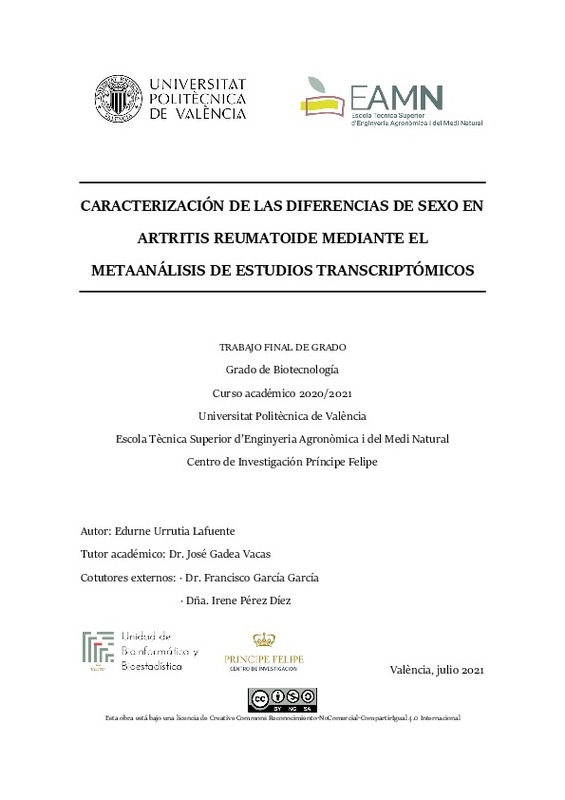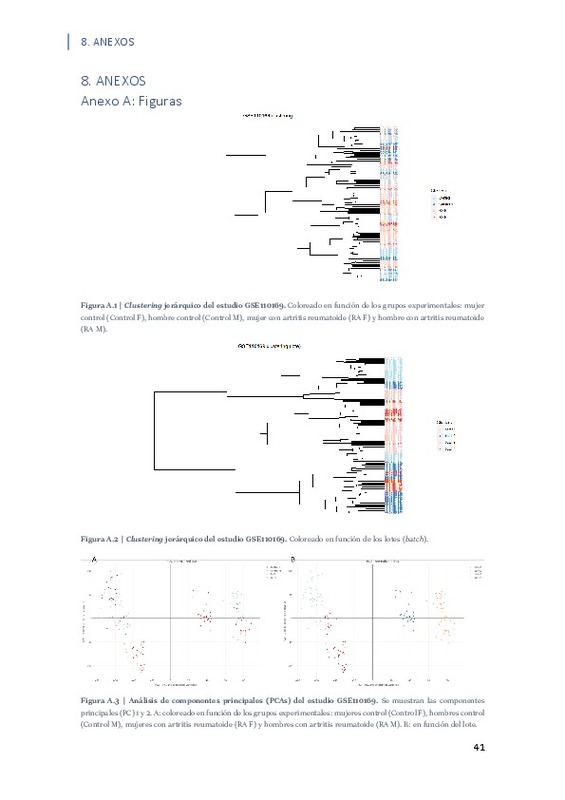|
Resumen:
|
[ES] Las enfermedades autoinmunes, entre ellas la artritis reumatoide, presentan una mayor prevalencia en mujeres que en hombres. Según la literatura, el sistema inmunitario actúa de forma diferencial entre sexos. Aunque ...[+]
[ES] Las enfermedades autoinmunes, entre ellas la artritis reumatoide, presentan una mayor prevalencia en mujeres que en hombres. Según la literatura, el sistema inmunitario actúa de forma diferencial entre sexos. Aunque las hormonas sexuales desempeñan un papel fundamental, no se conocen por completo las diferencias en los mecanismos moleculares. Una mejor comprensión de estos mecanismos proporcionaría una mayor precisión en el diagnóstico y la personalización de tratamientos en función del sexo.
El objetivo de este Trabajo Final de Grado es, por lo tanto, la identificación y comprensión de los mecanismos moleculares diferenciales que subyacen a la artritis reumatoide por sexos, con el fin de mejorar el diagnóstico y la selección de los tratamientos para cada grupo de pacientes.
Para ello, se realizó, en primer lugar, una revisión sistemática de estudios de artritis reumatoide con datos de microarrays de expresión génica o RNA-seq de individuos sanos y pacientes. Se recopilaron 5 datasets con 570 muestras del repositorio GEO. A continuación, se analizaron individualmente los cinco estudios seleccionados. Este paso incluyó un análisis exploratorio, un análisis de expresión diferencial y un análisis de enriquecimiento funcional de procesos biológicos de la Gene Ontology (GO) y de rutas KEGG. Finalmente, se llevó a cabo un metaanálisis de genes mediante un modelo de efectos aleatorios, seguido de un enriquecimiento funcional de los resultados globales. De este modo, se identificaron 10 biomarcadores, 90 procesos biológicos y 11 rutas KEGG específicos de sexo estadísticamente significativos. Además, los resultados del enriquecimiento se sintetizaron empleando la herramienta REVIGO y los términos GO slim. Entre otras funciones, los resultados sugieren una actividad aumentada del sistema inmune en la mujer enferma, ligada a una mayor presencia de precursores energéticos; así como una sobrerrepresentación de términos relacionados con la síntesis proteica y la regulación negativa de los osteoblastos en hombres con artritis reumatoide.
En definitiva, este estudio ha permitido caracterizar las diferencias de sexo en pacientes con artritis reumatoide, identificando biomarcadores y funciones sobrerrepresentados en cada sexo. Estos hallazgos podrían conducir al descubrimiento de nuevas dianas terapéuticas y proporcionar la base para futuras investigaciones dirigidas a la medicina de precisión en la artritis reumatoide.
[-]
[EN] Autoimmune diseases, including rheumatoid arthritis (RA), are more prevalent in women than in men. According to the literature, the immune system acts differently between the sexes. Although sex hormones play a key ...[+]
[EN] Autoimmune diseases, including rheumatoid arthritis (RA), are more prevalent in women than in men. According to the literature, the immune system acts differently between the sexes. Although sex hormones play a key role, the differences in the molecular mechanisms are not fully understood. A better understanding of these mechanisms could provide greater diagnostic precision and personalised treatments by sex. Therefore, the aim of this Final Degree Project was to identify and understand the molecular mechanisms underlying sex-based differences in rheumatoid arthritis, to improve the diagnosis and the selection of treatment for each group of patients.
This goal was achieved in three steps. First, we conducted a systematic review of rheumatoid arthritis studies with gene expression microarray or RNA-seq data from healthy individuals and patients. Five datasets that included 570 samples were retrieved from the Gene Expression Omnibus (GEO) repository. Second, the selected studies were individually analysed. This step included an exploratory analysis, a differential expression analysis, and a functional enrichment analysis of biological processes from the Gene Ontology (GO) and KEGG pathways. Finally, we performed a gene meta-analysis using a random effects model, followed by a functional enrichment of the overall results. Thus, our analysis revealed 10 biomarkers, 90 biological processes and 11 KEGG pathways as significantly sex-dependent. In addition, the results were synthesized using the REVIGO tool and GO slim terms. Among other functions, the outcomes from the enrichment suggest an increased activity of the immune system and a greater presence of energy precursors in female RA patients. Male RA patients, instead, showed an overrepresentation of terms related to protein biosynthesis and negative regulation of osteoblasts.
In conclusion, we were able to characterise sex differences in patients with rheumatoid arthritis, identifying biomarkers and functions overrepresented in each sex. Our findings could lead to the discovery of new therapeutic targets and be the basis of future research devoted to sex-specific precision medicine in rheumatoid arthritis.
[-]
|








